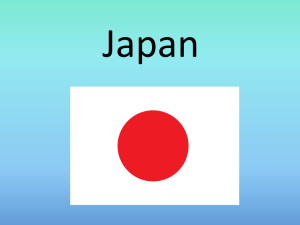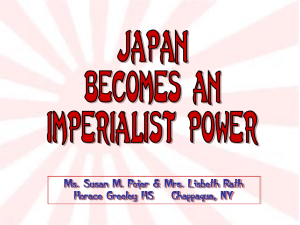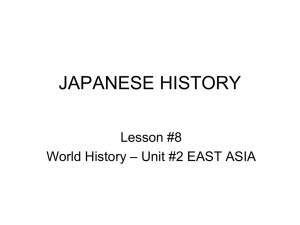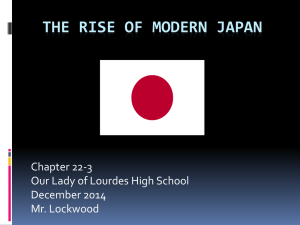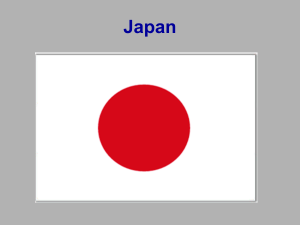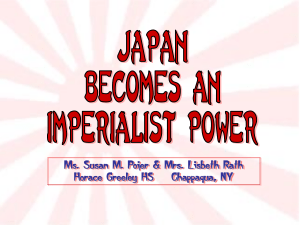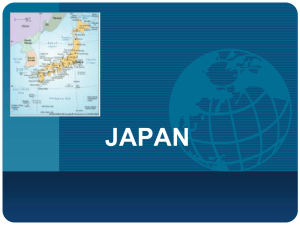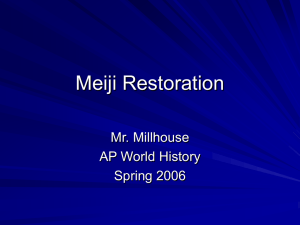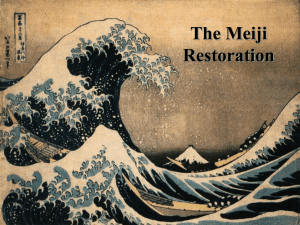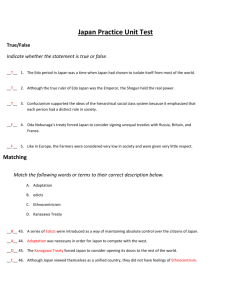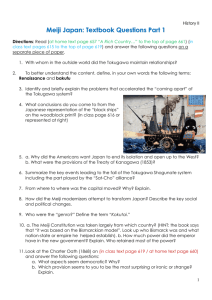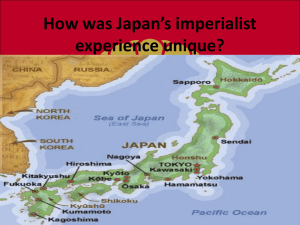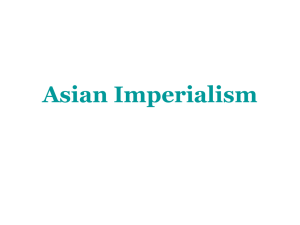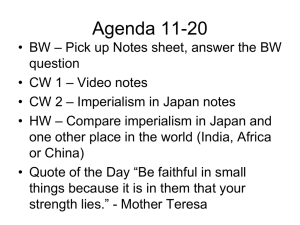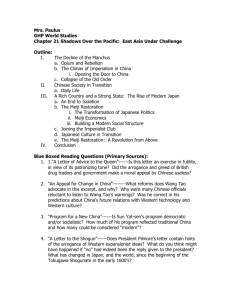Japan Becomes an Imperialist Power
advertisement
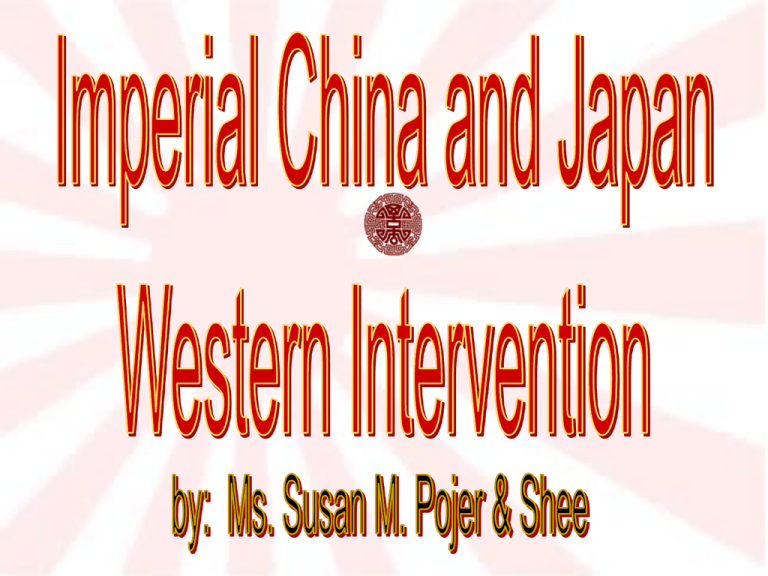
QING – Remember? TAKE NOTES! BRITISH FIGHT BACK AGAINST THE CANTON SYSTEM OPIUM WAR BANNERMEN Traditional Chinese Fighters (like Janissaries) TREATY OF NANKING No more Canton System • Treaty Ports went from 1 – 5; later 90+ • Hong Kong became a British colony • EXTRATERRITORIALITY RIGHTS for British citizens living in China • Most-Favored Nation status • Legalized the right to import opium • Christian missionaries But resentment against foreigners! TAIPING REBELLION (1850-1864) WEAKENS CHINA UTOPIA or DYSTOPIA? Ms. Susan M. Pojer & Mrs. Lisbeth Rath Horace Greeley HS Chappaqua, NY BACKGROUND • Tokugawa Shokunate takeover – Emperor has symbolic power, Shogun has all the power in provinces (China is centralized; Japan is decentralized) BUT - Can’t coordinate efforts and resources to resist invasion • ERA OF PEACE • When Europeans interfere and Japan worries about traditions - SECLUSION!!! All Europeans out!!! 1853 – Commodore Matthew Perry “Opens Up” Japan to Western Trade! What Did the U. S. Want?? Coaling stations. More trading partners. A haven for ship-wrecked sailors. Perry’s “Black Ships” The Treaty of Kanagawa - 1854 Japan Learns a Lesson! In 1862, just before the start of the Meiji period, Tokugawa sent officials and scholars to China to study the situation there. A Japanese recorded in his diary from Shanghai… The Chinese have become servants to the foreigners. Sovereignty may belong to China but in fact it's no more than a colony of Great Britain and France. China’s “Unequal Treaties” After the Opium War of 1839-1842, Japan was convinced that it had to Open Up to the West. The Shi-shi (“Men of High Purpose”) Highly idealistic samurai who felt that the arrival of Westerners was an attack on the traditional values of Japan. They believed that: Japan was sacred ground. The emperor, now a figurehead in Kyoto, was a God. Were furious at the Shogun for signing treaties with the West without the Emperor’s consent. Their slogan Revere the Emperor, Expel the Barbarians! The Meiji Revolt - 1868 A group of samurai overthrow the Shogunate because they were angry that the Shogunate signed treaties with West without Emperor’s consent “revere the emperor, expel barbarians” – afraid Japan would be under W. control! The Shogunate Is Overthrown! The last Shogun. Tokugawa Yoshinobu. The Emperor Is “Restored” to Power MEIJI “Enlightened Rule” MEIJI • - Refers to restoring Emperor to power but also WHOLE PERIOD OF JAPANESE INDUSTRIAL MODERNIZATION • Do not want to be western, but want to have political, economic and military equality to Western Powers while PRESERVING their culture • A modern industrial economy under authoritarian, emperior rule! IMERIALISM! Newspaper Cartoon, 1870s? Enlightened Half-Enlightened Un-Enlightened Modernization by “Selective Borrowing” Popular board game. Start by leaving Japan & studying in various Western capitals. End by returning to Japan and becoming a prominent government official. European Goods Europe began to “loom large” in the thinking of many Japanese. New slogan: Japanese Spirit; Western Technology! The Japanese Became Obsessed with Western Styles Civilization and Enlightenment! Everything Western Was Fashionable! Everything Western Was Fashionable! Japanese soldiers with their wives. The Rulers Set the Tone with Western Dress Emperor Meiji Empress Haruko (1868- 1912) Changing Women’s Fashions 1900 Styles The First “Miss Japan” (1908) Abolition of the feudal system Modern Banking System Land Redistribution Meiji Reforms Written Constitution (Germans) Westernize the School System (Fr. & Ger.) Modernize the Army (Prussian) Build a Modern Navy (British) Human Rights & Religious Freedom Emperor Worship Intensified Expansionism & the Rise of Military Power New players on the block? Sino-Japanese War: 1894-1895 The Meiji Emperor was in Hiroshima during the Sino-Japanese War Soldiers on the Battlefield During the Sino-Japanese War The Treaty of Shimonoseki ended the war. Today—Tensions Between China & Japan Offshore gas field in the East China Sea reveals recently strained relations between China & Japan. Tension over disputed gas field on the rise, exacerbating mutual mistrust dating back to the Sino-Japanese War. EEZ-Exclusive Economic Zone. The Russo-Japanese War: 1904-1905 The Battle of Tsushima: The results startled the world! President Teddy Roosevelt Mediates the Peace The Treaty of Portsmouth, NH ended the Russo-Japanese War. Japan Annexes Korea Japan Is a Player in China Competition from Another “Pacific” Power Is on the Horizon The U. S. “Great White Fleet” But, Japanese Power Would Grow . . .
